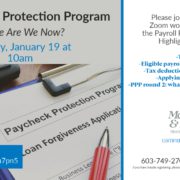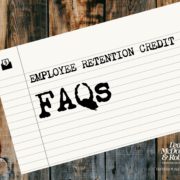Temporary 100% deduction for Business Meal Expenses
Contributed by: Jason Gaskell, Principal
The IRS is continuously adding and modifying regulations and guidance for taxpayers. One such updated legislation was a temporary, 100% deduction for business meal expenses. As part of the Consolidated Appropriations Act, the U.S. government released guidance that offered a temporary, 100% deduction for restaurant-provided business meal expenses.
Before the Consolidated Appropriations Act, business meal expenses capped out at a 50% deduction. However, designed specifically to help restaurants impacted by the COVID-19 pandemic, the recent (and more importantly, temporary) update allows for a full deduction for qualifying restaurant meals. The temporary meal deduction can be taken for amounts paid or meal expenses incurred after December 31, 2020 and before January 1, 2023.
The Consolidations Appropriations Act offers clarification to taxpayers regarding the meals that qualify for the 100% tax deduction. As outlined in the notice, the term “restaurant” refers to a business entity that prepares and sells food or beverages to retail customers for immediate consumption, regardless of whether the food or beverages are consumed on the business’s premises.
The Act also offers insight into what a restaurant does not include. According to the legislation, a restaurant does not include a business entity that primarily sells prepackaged food or beverages, not for immediate consumption, such as:
- Specialty food store
- Grocery story
- Beer, wine, or liquor store
- Convenience store
- Newsstand
- Drug store
- Vending machine
- Kiosk
While these types of venues are not considered restaurants, it’s important to note that that the original 50% limitation will still apply to the amount of any deduction otherwise allowed for expenses incurred acquiring food or beverage from these types of businesses.
Additionally, employers also have the ability to not treat the following as a restaurant:
- Any eating facility located on the employer’s business premises and used in furnishing meals excluded from an employee’s gross income; or
- Any employer-operated eating facility treated as a de minimis fringe, even if that eating facility is operated by a third party.
At Leone, McDonnell & Roberts, Professional Association, we help our clients stay on top of the very latest tax legislation, including the Consolidated Appropriations Act. Contact us today to discuss your tax questions with one of our experienced and professional CPAs.










